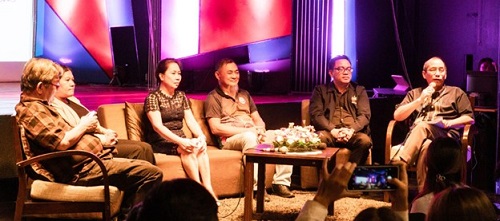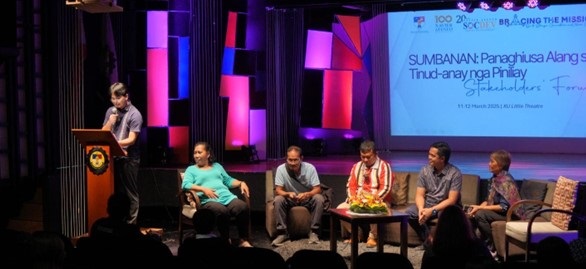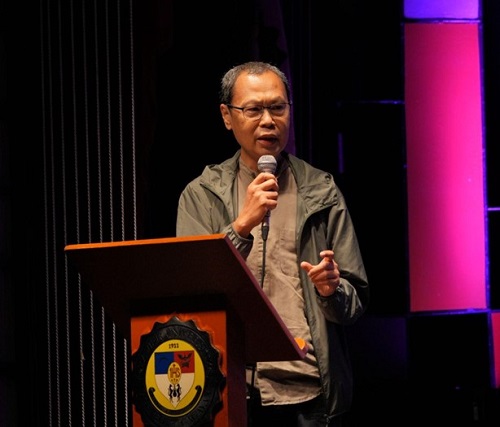By Ms Paulyn Erica M Porras
SLP Formator
 In Photo: Resource persons receiving their certificates during the Multi-Sectoral Election Forum held on 11-12 March 2025, at the XU Little Theater.
In Photo: Resource persons receiving their certificates during the Multi-Sectoral Election Forum held on 11-12 March 2025, at the XU Little Theater.
Xavier Ateneo's Social Development Cluster marked two decades of commitment to social development with a weeklong celebration themed "Bracing the Mission: On to Stronger Connections and Newer Grounds." A key activity during Social Development Week was SUMBANAN: Panaghiusa Alang sa Tinud-anay nga Piniliay, a two-day Multi-Sectoral Election Forum held on 11-12 March 2025, at the XU Little Theater. Organized by the Social Involvement and Advocacy Program, under the leadership of Mr Nestor Banuag Jr, the forum addressed the upcoming 2025 elections. It is aimed at strengthening democratic engagement by promoting transparency, accountability, and inclusive participation, specifically in Cagayan de Oro and Misamis Oriental. The forum convened key election stakeholders, students, faculty, and formators to engage in discussions on governance and active citizenship.
Day 1: Election Governance and Oversight
The forum’s first day opened with a message from Fr Mars P Tan, SJ, University President, who emphasized the importance of dialogue and preparation for the upcoming elections. "If you want good governance, you have to ensure you are responsible and well-informed," he stated, addressing the participants, especially the students. He encouraged them, as the hope of the nation, to contribute positively to the country and their local communities. He also highlighted the value of clean and responsible elections, connecting it to the Jubilee Year as a symbol of renewal and new beginnings.
The first day of the forum focused on discussions on Election Governance and Oversight, with Atty Gina Luna Zayas-Sabio, Regional Election Attorney of Commision on Elections (COMELEC) Region 10, as the key resource person. In her discussion, she emphasized the role of the Committee Kontra Bigay 2.0 in fortifying electoral integrity through the deterrence, enforcement, and prosecution of vote-buying and vote-selling.
Atty Zayas-Sabio discussed the legal definitions and consequences of election offenses, emphasizing that vote-buying is as serious as vote-selling. Calling vote-buying “the modern cancer of our country,” she warned of its evolving forms and stressed shared accountability, asserting, “The vote buyer is equally guilty as the vote seller.” She concluded by underscoring voter awareness, stating, “We need to know our rights,” and reminded participants that “Election is a gift from God, to be exercised from our mind and heart.”
 In Photo: Mr Derrick Bart B Pimentel moderating the Day 2 conversation
In Photo: Mr Derrick Bart B Pimentel moderating the Day 2 conversation
about electoral governance and oversight
Several representatives from Election Monitoring Groups attended the forum to share their reactions to Atty Zayas-Sabio’s talk. These included Mr Roberto E Villaluz, Lay Coordinator of the Archdiocese of Cagayan de Oro for the Parish Pastoral Council for Responsible Voting (PPCRV); Mr Eric Alvia, Secretary-General of the National Movement for Free Elections (NAMFREL), represented by Mr Nestor M Banuag, Chairperson of Cagayan de Oro, Misamis Oriental NAMFREL; Ms Louwallien Donnah Velez, Senior Administrative Officer of the Legal Network for Truthful Elections (LENTE); and Mr Froilan Gallardo, President of the Cagayan de Oro Press Club.
The open conversation was moderated by Mr Derrick Bart B Pimentel, faculty of the Philosophy Department, which revolved around the discussion of vote buying and voters' education as critical issues in Philippine elections. During the conversation, Atty Gina Zayas-Sabio firmly stated that refusing to participate in vote buying is the simplest yet most powerful step individuals can take. However, Mr. Gallardo offered a contrasting perspective, highlighting the harsh realities of poverty, where many urban poor communities have no choice but to accept money during elections.
The need for voter education was a central theme, with Mr. Banuag pointing out that elections today lack clear standards, making continuous dialogue and awareness campaigns essential. Ms Velez stressed the importance of integrating voter education into the formal curriculum, noting that even elementary students engage in vote-buying-like behaviors in school elections. Mr Viallluz echoed this, emphasizing that discussions on vote buying should not be seasonal but a year-round educational effort.
The conversation also addressed the role of politicians in perpetuating vote-buying, with audience members proposing that disciplining candidates and utilizing covenant signings could help curb electoral misconduct. Ultimately, the speakers stressed the importance of democracy and ethical voting.
Atty Zayas-Sabio conducted a demonstration of the automated voting machines, addressing concerns about hacking. She clarified that the machines operate as stand-alone units, disconnected from the internet during the voting process. Internet connectivity is established only after voting concludes to transmit results securely. She further explained that seven result copies are generated simultaneously for seven servers to ensure transparency. Additionally, rejected ballots are placed in a separate envelope and tallied at the end to maintain accuracy and integrity in the final count.
Fr Ismael Jose Chan-Gonzaga III, SJ, Assistant Dean of XU School of Law, closed the day 1 activity with a call to uphold integrity in elections, emphasizing that true patriotism goes beyond voting—it requires active responsibility in shaping the nation’s future. He warned against vote-buying, stating that those who engage in it see people as mere commodities rather than individuals with dignity. He urged voters to reject such practices and stand firm in protecting democracy.
Day 2: Multi-Sectoral Dialogue
The second day of the activity commenced with a welcoming message from Engr Dexter S Lo, Vice President for Social Development. The session focused on a multi-sectoral dialogue on electoral integrity and community engagement. Sectoral representatives in attendance included Mr Liam Osorio of Tabang Sikad Organization, Inc, Ms Donna P Echalico of Kinaiyahan Coalition, Datu Jude “Masikal” Jabiniar, Indigenous Peoples Mandatory Representative (IPMR) of the TACATCU Ancestral Domain Council, Mr Joel Gabatan of the United Drivers’ Association, and Ms Marylou Aljo of the Kiapo Palalan Farmers Irrigators Association.
 In Photo: Mr Liam Osorio sharing key youth concerns during Day 2 of the Multi-Sectoral Forum.
In Photo: Mr Liam Osorio sharing key youth concerns during Day 2 of the Multi-Sectoral Forum.
During the multi-sectoral dialogue, sectoral representatives articulated key concerns impacting their communities. Mr Osorio emphasized the critical role of youth in governance and policy-making, while also addressing pressing issues like mental health, misinformation, and climate change. Ms. Echalico raised concerns about environmental degradation, advocating for ecological responsibility and stricter resource management policies. Datu "Masikal" stressed the importance of protecting Indigenous Peoples’ rights and urged voters to approach elections with thoughtful decision-making, recognizing it as a sacred responsibility.
Mr Gabatan, on the other hand, called for government support and empowerment for the transport sector, advocating for sustainable solutions over mere financial aid. Ms Aljo highlighted the struggles of the agricultural sector, emphasizing the need for sustainable policies, improved logistics, and stronger government intervention. Each sector presented a unified call to action, urging voters to elect leaders who prioritize genuine service, inclusive development, and long-term solutions for their communities. Dr Carthelyn C Adajar, SD Coordinator for the College of Arts and Sciences- Humanities, moderated the dialogue.
Sharing his key takeaways from the multi-sectoral dialogue, Economics Department Chairperson Mr Jhon Louie Sabal emphasized the crucial role of agriculture and inclusivity in economic growth. He highlighted agriculture as a key contributor, particularly in Region X, stating, "While we cannot produce all agricultural products in Cagayan de Oro, we can become a hub, maintaining the value chain." He also stressed that poverty reduction should extend beyond simply lowering statistics: "It's not enough to give resources—we must teach people how to maximize and use them sustainably," he explained, underscoring the need for long-term solutions that foster genuine development.
Dr Astrid Cinco, Director of the McKeough Marine Center of Xavier University, highlighted the institution's role in connecting sectoral issues with authorities and candidates, stating, "Xavier University is committed to engaging with different sectors in society." She emphasized the importance of voter education, asserting, "A well-informed voter changes the course of our history." Dr Cinco concluded by reaffirming Xavier Ateneo's commitment to collaborative problem-solving: "We are here not just to hold forums, but to aid in resolving the various sectoral issues and concerns."

Fr Antonio F Moreno, SJ, concluded the Day 2 activity by expressing gratitude to the sectoral representatives, students, and faculty attendees and emphasizing the valuable learning experience for all. He highlighted the need for cross-sector collaboration in finding solutions and urged continued engagement beyond the elections to ensure that policymakers address sectoral concerns. "We must find ways to amplify the voices of sectoral representatives so that candidates take action," he stated. Finally, he encouraged a shift in political perspective, saying, "We should change the way we do politics," and affirmed that good governance is still attainable. "There are still leaders who can genuinely serve the people. Don't give up on politics," he concluded.
Recognizing elections as a vital exercise of democracy, Xavier Ateneo is committed to fostering informed and engaged voters. The university actively creates platforms for dialogue, education, and advocacy, aiming to empower citizens to protect the integrity of the electoral process. This includes facilitating discussions on critical issues like vote-buying, promoting voter awareness of their rights and responsibilities, and providing access to accurate information about candidates and electoral procedures. Xavier Ateneo believes that informed participation is essential for ensuring fair and transparent elections.